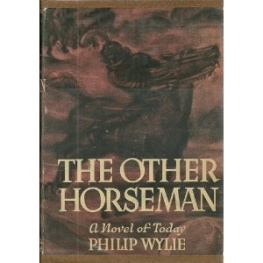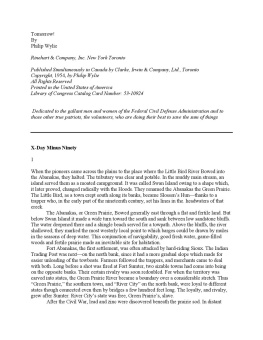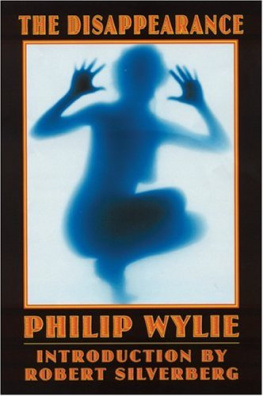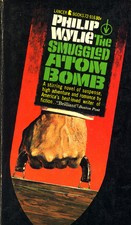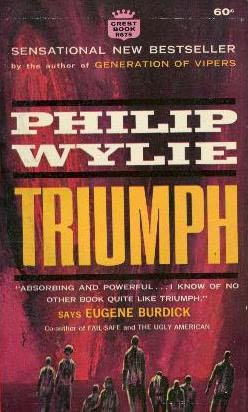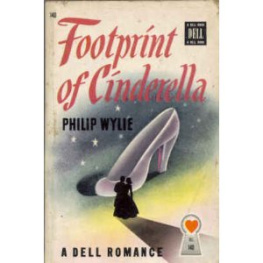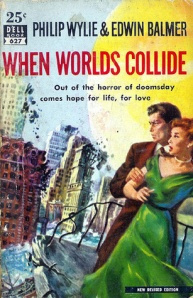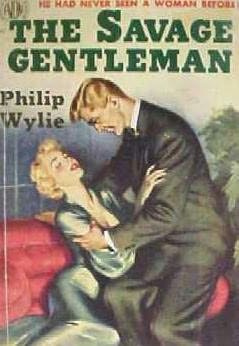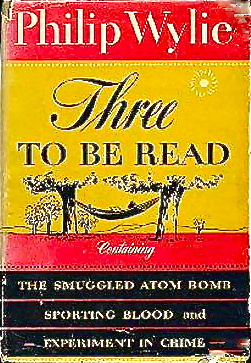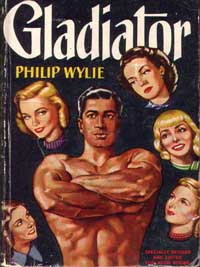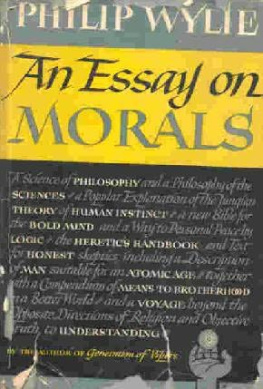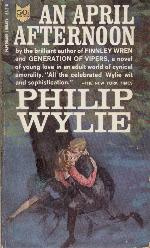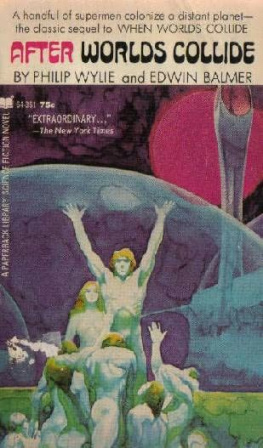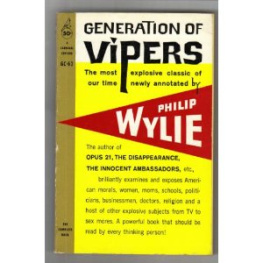Philip Wylie - The Other Horseman
Here you can read online Philip Wylie - The Other Horseman full text of the book (entire story) in english for free. Download pdf and epub, get meaning, cover and reviews about this ebook. year: 1942, publisher: Farrar & Rinehart, genre: Art. Description of the work, (preface) as well as reviews are available. Best literature library LitArk.com created for fans of good reading and offers a wide selection of genres:
Romance novel
Science fiction
Adventure
Detective
Science
History
Home and family
Prose
Art
Politics
Computer
Non-fiction
Religion
Business
Children
Humor
Choose a favorite category and find really read worthwhile books. Enjoy immersion in the world of imagination, feel the emotions of the characters or learn something new for yourself, make an fascinating discovery.
- Book:The Other Horseman
- Author:
- Publisher:Farrar & Rinehart
- Genre:
- Year:1942
- Rating:5 / 5
- Favourites:Add to favourites
- Your mark:
- 100
- 1
- 2
- 3
- 4
- 5
The Other Horseman: summary, description and annotation
We offer to read an annotation, description, summary or preface (depends on what the author of the book "The Other Horseman" wrote himself). If you haven't found the necessary information about the book — write in the comments, we will try to find it.
The Other Horseman — read online for free the complete book (whole text) full work
Below is the text of the book, divided by pages. System saving the place of the last page read, allows you to conveniently read the book "The Other Horseman" online for free, without having to search again every time where you left off. Put a bookmark, and you can go to the page where you finished reading at any time.
Font size:
Interval:
Bookmark:
by
PHILIP WYLIE
FARRAR & RINEHART, INC.
NEW YORK TORONTO
COPYRIGHT, 1942, BY PHILIP WYLIE
PRINTED IN THE UNITED STATES OF AMERICA
ALL RIGHTS RESERVED
THE OTHER HORSEMAN
THERE IS a legend concerning John, the Prophet, to the effect that he lost in Ephesus, in the year 89 A.D., the first transcription of his Vision. This version was come upon by the Romans, from whom he had precipitately fled, and read by a certain Centurion before it was officially burned according to the Emperor's orders. It is said to be a second version, written by the Prophet in hiding some twelve months later, that concludes the New Testament. Of the first and original account, only one fragment survives, John's recollection of the "other horseman" which appears in a letter written either by, or for, the Centurion, to a poet named Marcus. The letter (if there was one) is supposed to have been lost during the persecutions of Diocletian. Thus the account was preserved only by word of mouth, although it is said to have been a favorite of Saint Leo the Great, as early as the middle of the fifth century. The Apocalyptic legend follows: After the breaking of the Fourth Seal, and after the emergence of the Pale Horseman, Death, John saw yet another horseman, now recorded as Hell, but originally given another name. This Fifth Rider went forward with the other Four, and, indeed, led them. War and Pestilence, Famine and Death scourged the world of men. These grim figures had somewhat different names in the lost Apocalypse: Conquest, Slaughter, Greed, and Universal Death, i.e., death by famine, by pestilence, by the sword, and by all human passions.
As mankind fell by a third and yet another third, and as the seas turned to blood and fiery glass, the Horseman in the Lead became nauseated by the deeds of his fellows.
He therefore pressed far ahead of them, entering every village and city with a great cry and a terrifying warning. To the rulers of each city he told of those who came hard behind him and he showed them the blood on his horse's hooves. Then, always, he went on, for his urgency was great.
Behind him, men fell into profound arguments, some saying that he was a liar, some that the blood on the hooves was not of men but of goats, and some that he had not passed that way at all, but was only an imagining of the people. These arguments consumed much time and took many peculiar theological bents. In the end, the warning did not anywhere prevail. The Four Riders arrived and slew their three times tens of thousands.
Meanwhile, the Fifth Horseman had come to the outermost reaches of the earth and so turned about, well satisfied with his work. However, as he came upon first one and then another desolated city, anger mounted in him. When he questioned the survivors about the warning they had been given, he found them unrepentant. They did not say they had been fools to disobey the alarm. They did not say that the arrogant stupidity of their rulers had betrayed them and robbed them of their homes, their loved ones, and their birthright. Instead, in one voice, they blamed him who had carried the message. "He should have tarried longer with us and talked in a louder voice," the weeping people cried. "He should have seen our helplessness and stayed with us to defend us," they said.
And they said, "It is his fault; had he not come this way, the others would not have followed!"
So, because his wrath was very great, and because the truth was not in these people, the Fifth Horseman rejoined his companions. Together they slew all mankind and destroyed all their cities. And the name of him who led, and of him who warned, according to the legend, was Reality.
The Other Horseman
IN SPITE of the proverb, a lucky prophet is sometimes honored in his home town, Jimmie thought. The train rounded down a grade; shredded steam blew back from the locomotive. The scenery became minute by minute more cogent, and at last, altogether familiar. Too familiar for Jimmie in a way. His eyes stung and the sensation astonished him. He had thought he was past all that, young to be past it--twenty-eight--but past it, nonetheless. As far past as if he were ninety and the very ducts that carry tears had dried up. He grinned, sniffed in a breath, and yanked the back of his hand across the upper part of his face. Six years in England--and in two more minutes, home.
The train clanged out on the high iron bridge over the Muskogewan. He could see the skating house--white snow and ice, fast water, brightly dressed kids whizzing among the grownups--and that was gone; the Dairymeade barns flashed past--the fields, rolling, black, white, lithographic; home--after all these years! The red brick station was swinging into view around the curve. A warm flush pervaded him, as if he had stepped in front of a fireplace.
Jimmie grappled with the heaviest of his leather suitcases, the one most battered, deepest scratched, most raggedly shingled with European hotel labels. There was a big
"V" pasted on its side. He was on the platform when the train slowed. There was his father-six years older, not looking it; his mother--red-cheeked, gray-haired, handsome; and there was his brother, Biff--he'd be twenty-one, now--Jimmie had already made the adjustment in his mind. He looked for his sister. Sarah had been twelve when he'd gone away on the Rhodes Scholarship. At first, he glanced past the pretty woman. He realized, while his eyes were in a nether focus, that the pretty woman was Sarah. The whole fam dambley. It was wonderful!
He hopped down while the train was still slowing and slid in the snow a little way and kissed his mother and his sister and shook hands twice, each, with his father and his brother. There were other people waiting to greet Jimmie, but those people let his family have the first crack; they simply stood around, grinning and happy.
Jimmie's eyes were taking in the changes of six years and he was pleased with what he saw. Sarah, especially, was like a miracle. But the others weren't quite pleased.
Their expressions showed it, inch-meal. Perhaps he had more of an accent than he'd thought.
"You've changed, son!" His father seemed truculent about it.
Jimmie chuckled. "A kid went to Oxford. This is what's coming back."
"Terribly thin," his mother said. "It's the rations, no doubt."
Jimmie still laughed. "Oh, I got plenty to eat. Lord! Sarah! Hollywood'll send for you if you show that face around much!"
All three men picked up bags. Jim put his down again to shake hands embarrassedly with a dozen people whose faces were familiar but whose names were lost in six weltering years. They supplied them and told him what businesses they were in or where they lived, and he remembered fragments. Then the Baileys started around the station, chattering about the unseasonable freeze and snowstorm. Biff got to the car first and opened the door; Jimmie stood outside for a minute, looking at it.
"A 'forty-two," Biff said exultantly. "Like it?"
"Yeah." Jimmie's enthusiasm was not great. "It's magnificent. Haven't seen the new American models for a long time. It's a peach. Drives itself, I'll bet. Sees in the dark and plays records."
They laughed, but not quite certainly. The car started. Jimmie peered from a window while his family partially recovered from some vague emotion he was beginning to feel in them--a sort of disappointment, probably. Jimmie filed it away and allowed himself to revel in remembered geography, in architecture recalled. Muskogewan's highest structure--the Purvis Building, eleven stories--and the old Post Office, empty, across from a modernistic new one, the fire house, the Horkin Store, "A Block of Bargains," and Dunley's Drug Store. Ordinary stuff, dream-poignant for Jimmie.
Next pageFont size:
Interval:
Bookmark:
Similar books «The Other Horseman»
Look at similar books to The Other Horseman. We have selected literature similar in name and meaning in the hope of providing readers with more options to find new, interesting, not yet read works.
Discussion, reviews of the book The Other Horseman and just readers' own opinions. Leave your comments, write what you think about the work, its meaning or the main characters. Specify what exactly you liked and what you didn't like, and why you think so.

